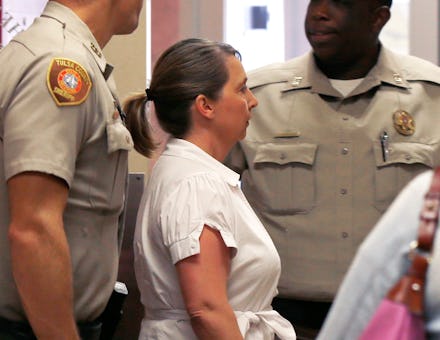What is temporary hearing loss? Officer Betty Shelby's defense raises questions.

Tulsa police officer Betty Shelby has said she didn't know her backup had arrived when she shot and killed Terence Crutcher, a 40-year-old unarmed black man, on Sept. 16. She didn't hear the shot — her shot — that killed him after he walked away from Shelby with his hands up.
Shelby's lawyer said she had "auditory exclusion," according to Tulsa World — temporary hearing loss that causes people in high-stress situations not to hear sounds around them. It's like tunnel vision, but with your ears.
"She didn't hear the gunshot, didn't hear the sirens coming up behind her just prior to the shot," Scott Wood, who represents Shelby, said Thursday, according to the Associated Press. "And it's not only a common phenomenon described in literature, but it's the No. 1 perceptual distortion by people I have represented who have been involved in shootings — diminished sound or complete auditory exclusion."
Mic obtained footage from Tulsa police, showing officer Shelby's approach, and shooting, of Terence Crutcher.
(Editor's note: This video contains disturbing footage. View with discretion.)
Stress can do funny things to your brain. It can trip your "fight or flight" response, when your adrenal glands release adrenaline and norepinephrine. From there, your heart rate and breathing increase, your blood vessels constrict and your muscles tighten.
When you have chronic stress, your adrenaline levels stay high. That can lead, eventually, to tunnel vision — a narrowing of the sight line, like physiological horse blinders. The same thing can happen in your ears.
Under high stress scenarios, some people can experience reduced hearing or deafness when faced with a perceived threat. A 2012 study released by the Karolinska Institutet's Department of Physiology and Pharmacology found a significantly higher prevalence of hearing problems in people with work-related stress. And it's reasonable to say being a police officer can wear on one's nerves.
But here's something to consider: Auditory exclusion isn't particularly common. Something that is common, according to William Barr, associate professor in the departments of neurology and psychiatry at NYU Langone Medical Center, is dissociation, or disconnecting yourself from the present situation.
"My take on it is, why invoke a very rare and possibly nonexistent condition when it's much more likely that a more common condition took over at that time?" Barr said in a phone interview Friday. "[Dissociation] is something we all go through. People just aren't processing information around them in the same way. It's also a big part of [post-traumatic stress disorder]."
According to Barr, you can predict dissociation. One of those ways is the Minnesota Multiphasic Personality Inventory, a test commonly given to police candidates to test emotional stability. The department has been using the MMPI for at least a decade, Tulsa police spokesperson Jeanne MacKenzie said in an interview Friday. But it doesn't catch everything.
"The MMPI is a self-reported test," Beverly Kaemmer, associate director and test division manager at University of Minnesota Press, said in a phone interview Friday. "It depends on how forthcoming they were in reporting their answers."
It's possible that Shelby, under duress, was experiencing dissociation. It's also possible she was experiencing the auditory exclusion her attorney said she had, which is why she pled not guilty to the first-degree manslaughter charge against her. The attorney believes it's a reasonable claim to say Shelby had a condition reflected most commonly in war zones, intense law enforcement events and firefighting.
When you search for auditory exclusion online, many of the results are related to the high-intensity military scenarios, experienced by people in the armed forces in life or death scenarios.
But that's not what this was. Shelby was not fighting on the front lines — and Crutcher, with his back turned and hands raised, was not an enemy combatant, a hostage-taker or a building erupting in flames. He was an unarmed black man with a broken-down SUV. If Shelby's brain saw Crutcher the same way it would see enemy combatants, it's a serious problem.